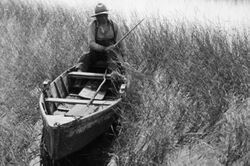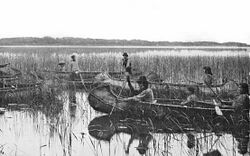Ricing stick
Topic: Engineering
 From HandWiki - Reading time: 2 min
From HandWiki - Reading time: 2 min
A ricing stick (Template:Lang-oj (singular), Template:Lang-oj (plural)[1]), also known as a flail, knocking stick,[2] or rice knocker,[1] is an agricultural hand tool used for threshing wild rice.[3][4][5][6]
Ricing sticks have been traditionally used by Anishinaabe peoples of the Great Lakes region.[7] The ricing sticks are used to harvest wild-growing rice by knocking the ripened grains off of the stalks of rice. This harvesting is typically performed by canoe—as the plants grow partially submerged in shallow water—and the sticks are used to knock the rice into the canoe or a collection vessel.[4] Any stick can be used, but ricing sticks are normally tapered, blunt sticks, sometimes with a flattened end, with a thicker end, sometimes lined in cloth, meant to be held in the hand.[8] Ricing sticks can be used two at a time, one in each hand, while a companion rows the canoe.[9]
While the tool has ancient roots, it continues to be utilized in modern society, even by non-indigenous people, and use of ricing sticks on public or tribal lands is often regulated.[10][11] For example, in Minnesota, wild rice on public land can be harvested only using hand-operated ricing sticks which must be "round, smooth wood no longer than 30 inches and weigh no more than one pound."[12] According to the 1854 Treaty Authority Ceded Territory Code, ricing sticks must be “round, smooth cedar, no longer than 32-inch,” while in Wisconsin, they can be up to 38 inches.[3]
External links
- Roger LaBine, of the Lake Superior Chippewa, demonstrates making ricing sticks at the 2017 Great Lakes Intertribal Summit.
References
- ↑ 1.0 1.1 Livesay, Nora; Nichols, John D., eds. "bawa'iganaak (na)". University of Minnesota. https://ojibwe.lib.umn.edu/main-entry/bawa-iganaak-na.
- ↑ Bowe, Nathan (2015-09-09). "At camp, people learn the traditional Ojibwe ways of harvesting, processing wild rice" (in en). https://www.dl-online.com/news/at-camp-people-learn-the-traditional-ojibwe-ways-of-harvesting-processing-wild-rice.
- ↑ 3.0 3.1 "A River Knock | Wisconsin Sea Grant" (in en-US). 2022-03-28. https://www.seagrant.wisc.edu/blog/a-river-knock/.
- ↑ 4.0 4.1 "The future of wild rice may depend on an unlikely alliance" (in en-US). 2023-02-15. https://thefern.org/2023/02/the-future-of-wild-rice-may-depend-on-an-unlikely-alliance/.
- ↑ "Wild Rice Harvest" (in en-US). https://www.nature.org/en-us/magazine/magazine-articles/ojibwe-wild-rice-harvest/.
- ↑ Pember, Mary Annette (September 30, 2020). "‘Manoomin will carry you through’: The healing power of the annual wild rice harvest transcends the pandemic". https://www.indianz.com/News/2020/09/30/indian-country-today-ojibwe-people-carry-on-wild-rice-tradition-amid-covid-19/.
- ↑ "Traditional Harvesting and Finishing". https://www.1854treatyauthority.org/wild-rice/traditional-harvesting-and-finishing.html.
- ↑ "When Everybody Called Me Gabe-bines, "Forever-Flying-Bird": Teachings from Paul Buffalo". https://www.d.umn.edu/cla/faculty/troufs/Buffalo/PB14.html.
- ↑ Milgroom, Jessica. "Wild Rice and the Ojibwe". Minnesota Historical Society. https://www.mnopedia.org/thing/wild-rice-and-ojibwe.
- ↑ "A hard day of ricing makes the beer go down easy" (in en). 2014-08-24. https://www.mprnews.org/story/2014/08/24/side-hustle-ricing.
- ↑ Press, Aaron Ogg | The Grand Rapids (2010-09-12). "Campers pay homage to American Indian tradition of gathering wild rice" (in en). https://www.mlive.com/outdoors/2010/09/campers_pay_homage_to_american.html.
- ↑ "Wild Rice Regulations" (in en). https://www.dnr.state.mn.us/regulations/wildrice/index.html.
 |
 KSF
KSF

